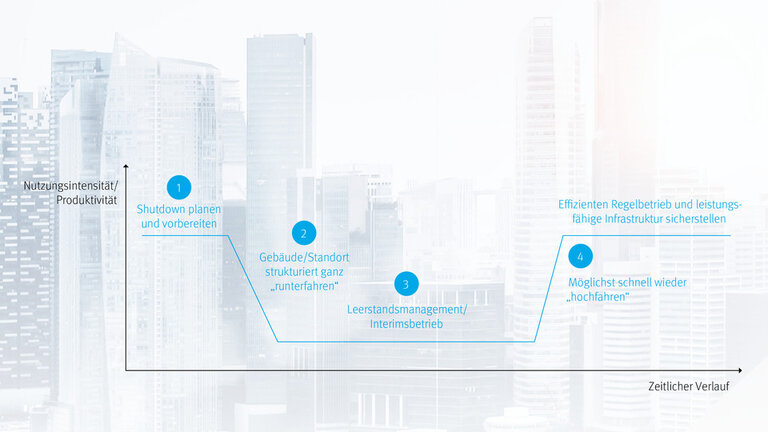Stuttgart, Germany, April 14, 2020. When companies ask their employees to work from home, and retailers are forced to close their businesses, they leave spaces or even entire buildings empty. Yet, for the most part, they still have to pay the costs of operating the buildings. This can be an additional burden for users of real estate in the current situation. Turn off the lights, close the door, and reduce costs? In most cases this is not how it works.
Checklists Serve as Initial Guide
Real estate consulting company Drees & Sommer has now compiled and published a list of the activities that are crucial for the temporary shutdown and recommissioning of manufacturing plants, hotels, corporate real estate, and office, retail and catering space. The publication includes checklists with tips about organization, processes, communication, cleaning and hygiene, operation and facility management, security and fire prevention, building and systems technology, and workstations.
Thomas Häusser, Partner at Drees & Sommer SE, commented: ‘Not only does the closure and decommissioning of the space or building have to be precisely planned and executed – the entire related infrastructure has to be shut down and later restarted in a structured way.’
Ensuring the Operator Takes Responsibility
In many cases, the Drees & Sommer Partner suggests, users of spaces, or their managers, are not aware of the extent of their responsibility as operators in the various areas of the company. Important duties relating to the management of vacant space are forgotten, he claims, thus giving rise to unnecessary costs and even inadvertently exposing them to operational risks. Much inspection and maintenance work – for instance, on air conditioning systems, fire protection equipment, elevators or emergency lighting, should not be postponed except in limited circumstances and should also only be carried out by qualified staff with proven expertise.
Making Appointments in Good Time
Thomas Häusser’s team colleague Bernd Fisel, Associate Partner at Drees & Sommer SE, warned: ‘In air conditioning systems and the drinking water supply network, water left standing in pipes poses by far the greatest risk. The most important thing is to prevent germs and bacteria from building up and reproducing, including the dreaded legionella.’ Strategies are also needed for the period following the Coronavirus restrictions, he added: ‘Drinking water systems, ventilation systems and air conditioning systems using humidifiers should be thoroughly inspected. It is also important for companies to talk to external service providers in good time to ensure that they are available when the facility reopens. It is already obvious that they will be overloaded with work after this period.’
Avoiding Damage to Systems
When systems are being restarted, they will need to be monitored to avoid damage and peaks in demand. The Associate Partner commented: ‘Ultimately, precautions will also have to be taken to ensure quick and flexible reactivation of the properties affected, at the same time as complying with legal provisions.’ He pointed out that this applies especially to systems with particular hygiene requirements, such as drinking water and ventilation systems, open cooling towers, and systems posing a particular danger to building users, the environment or third parties. He added: ‘It is advisable to carry out a comprehensive inspection of all systems to eliminate hazards – unless facilities have been inspected and maintained by qualified staff throughout the shutdown.’
Shutdown and Restart Managers Now Providing Advice to Clients Online
In short, the reopening and recommissioning should be planned in good time to allow the infrastructure of the building to be recovered or restarted. In addition to the checklists, Drees & Sommer offers online consulting on all these important steps in relation to temporary closures. Drees & Sommer is currently providing support to some of its clients in industry and the insurance sector to shut down individual buildings not currently in use, as well as to negotiate with existing facility management service providers, make arrangements for interim management, and suspend construction projects.
For more information, please visit: https://www.dreso.com/fileadmin/Aktuelles/en_Shutdown_Gebaeudesicherheit.pdf
